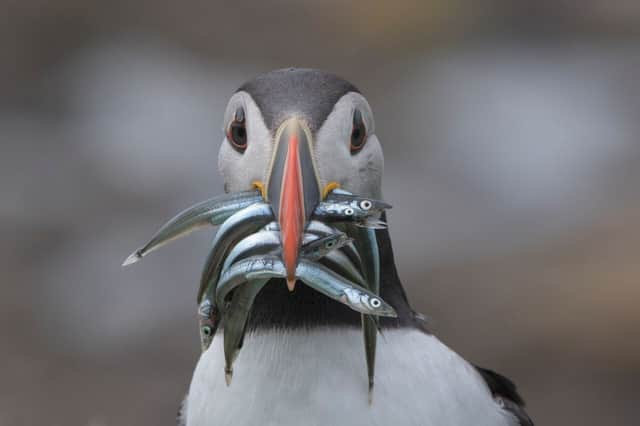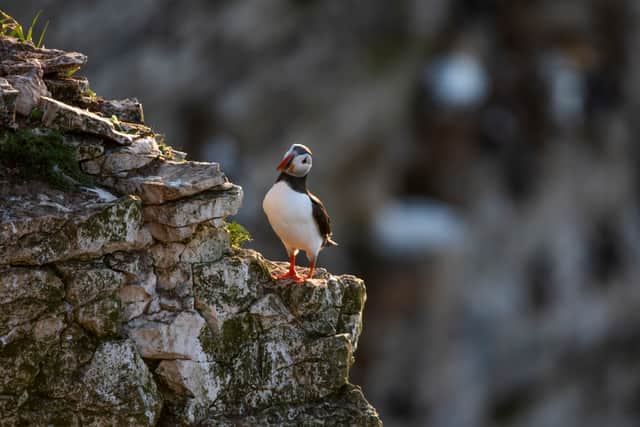Puffin season: Good news for vulnerable seabirds returning to UK to breed - after government 'lifeline'
This article contains affiliate links. We may earn a small commission on items purchased through this article, but that does not affect our editorial judgement.


One of the world’s most charismatic seabirds is returning to the British Isles this month to raise its adorable baby pufflings - and bird enthusiasts say a government lifeline has given them new hope for the vulnerable species.
Earlier this year, Defra - the government's Department for Environment, Food & Rural Affairs - called time on the North Sea’s controversial sandeel fisheries, which closed for good as of this month. The vast shoals of tiny, eel-like fish are a key food source for many marine species such as the harbour porpoise, as well as seabirds, including the puffin and kittiwake.
Advertisement
Hide AdAdvertisement
Hide AdPuffins - with their distinctive monochrome feathers and brightly-striped bills - are currently returning to northern parts of the UK to breed, with puffin season lasting from April until July. The Royal Society for the Protection of Birds (RSPB) says the much-celebrated government move will be a boon to the species this breeding season. However, it warned that more needs to be done to ensure puffins have a permanent future here.
The conservation charity said puffins have already been delighting visitors in recent weeks, with the birds sighted on Rathlin Island, in Northern Ireland and North Wales, and at a number of RSPB nature reserves including South Stack, Sumburgh Head in Shetland, and Bempton Cliffs - the UK’s biggest mainland seabird colony. At Bempton Cliffs on the East Yorkshire coast, around 3,000 puffins are expected to join the half-million seabirds nesting there this year. The RSPB says it hopes to see their beaks stuffed with sandeels, after the charity’s tireless campaign to protect their main food source.
Senior site manager Dave O’Hara said that although the reserve’s 400-foot chalk cliffs were home to one of the UK's top wildlife spectacles, seabirds were at the forefront of the climate emergency - and in significant decline. “Puffins’ resilience is being pushed to the limit, which is why we can breathe a sigh of relief that industrial sandeel fishing in UK waters has now been ended.


“This lifeline will help to secure vital food sources for these amazing birds. Whilst many other factors continue to affect our seabird populations, including the impacts of climate change, and bycatch from fishing, we have renewed hope that sandeels will increase in numbers, and help to save our beloved puffins,” he continued.
Advertisement
Hide AdAdvertisement
Hide AdBut RSPB conservation director Katie-Jo Luxton said stopping sandeel fishing was just the first step in safeguarding the seabirds. The most recent Seabirds Count census, published in November 2023, suggest that one in four puffins have been lost from the UK since 2000, and conservationists feared the British population could plummet 90% by 2050 if global warming went unchecked.
“We are in a nature and climate emergency, and our seabirds face a barrage of pressures; overfishing and climate change affecting food availability, poorly planned offshore marine development excluding them from key habitats, and, most recently, the devastating impacts of bird flu. We therefore cannot take the arrival of puffins back to our shores for granted,” she said.
The Atlantic puffin is considered ‘vulnerable’ by the International Union for Conservation of Nature (IUCN), although in the UK the species is on the conservation red list. Birds will continue arriving on British shores throughout April, stay to raise their pufflings - with each puffin laying just one egg - and then leave at the end of July.
The seabirds spend their winters out at sea, but experts still don’t know exactly where. The RSPB said it is believed they are widely dispersed across the North Sea and wider Atlantic Ocean.
Comment Guidelines
National World encourages reader discussion on our stories. User feedback, insights and back-and-forth exchanges add a rich layer of context to reporting. Please review our Community Guidelines before commenting.
